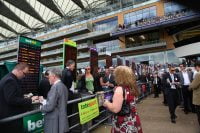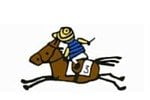[et_pb_section bb_built=”1″ admin_label=”section”][et_pb_row admin_label=”row”][et_pb_column type=”4_4″][et_pb_text admin_label=”Text” background_layout=”light” text_orientation=”left” use_border_color=”off” border_color=”#ffffff” border_style=”solid”]
Ascot Anecdotes – Pt3

An Ascot lady beats the bookies at their own game
After the First World War, betting enjoyed a huge surge in popularity. One of Ascot’s most unusual and successful bookmakers was a woman.
Mrs Helen Vernet was an heiress who had squandered her entire fortune on gambling once she was old enough to inherit, but had then made the wise decision that it was better to take bets than to make them. So she started taking bets, many from women, on her own account in the Members’ Enclosure and at the Parade Ring – until the bookmakers objected.
So successful was she that Ladbrokes suggested she represent them officially. She soon conducted all of their business on the rails and made enough to buy herself a partnership in the company.
She maintained her elegant and highly fashionable appearance throughout, and lived in extravagant style. However, obviously learning by her own early mistakes, she encouraged her many female clients to practice moderation and only bet small amounts.
Early Ascot racehorses went the extra mile… or twelve
The horses which originally raced at Ascot in the early 18th century were hunters, almost unrecognisable from the thoroughbreds we know today. They were built for strength and endurance rather than speed, which was just as well, as in those days they carried riders of about twelve stone.
Even more incredible when compared to the racing of today are the distances involved. Most races were run over four miles – but not just once. Instead, each race consisted of usually three or more four-mile heats, meaning a horse would routinely race for twelve miles or more during the course of the day.
From Russia With Love… during peacetime at least
In the 21st century, a sporting event like Royal Ascot has little to do with international politics, but in centuries past it was a forum in which kings and queens could put their allegiances on public display.
In 1844 the Royal Procession included Britain’s staunch ally Tsar Nicholas I, who enjoyed his day’s racing so much that he insisted on providing the prize each year – the Emperor’s Plate, which would replace the old Gold Cup.
However the Crimean War broke out ten years later, pitching Britain against Russia. So although the 1854 race card listed the prize for the Gold Cup as “a piece of plate value 500 sovereigns, the gift of His Majesty the Emperor of all the Russias”, no-one was particularly surprised when the trophy did not appear. It was quietly replaced with an old Gold Cup, and it goes without saying that the Tsar did not receive an invitation to The Royal Box that year.
Female racehorse owners – whatever next?
Even at the end of the 19th century, it was still accepted convention that women did not own horses in their own right. Some independent-thinking women had started to run horses under their own names, but Agnes, Duchess of Montrose, for example, entered her horses under the pseudonym “Mr Manton.”
“Mr Jersey” was well-known to be the pseudonym of Lillie Langtry, celebrated actress and mistress of King Edward VII when he was still Prince of Wales.
A tiny figure in Ascot history
The jockeys we see riding at Ascot today are highly trained and professional athletes, but in the 19th century there were no real rules regulating who could ride at Ascot (as long as they were male, of course). Even so, the spectators of 1840 were rather taken aback to see that one of the starters for the Wokingham Stakes was ridden by an 11-year-old boy, weighing only a little over two stone.
He admitted this was the first time he had ridden in a race, although he had taken horses out on the gallops many times…
| DID YOU KNOW? There was no racing at Ascot from 1740 to 1744 after an Act of Parliament was passed to “restrain and prevent the excessive increase of Horse Races” because horse racing for “small prizes or sums of money had contributed very much to the encouragement of idleness, to the impoverishment of many of the meaner sort of the subjects of this kingdom and the breed of strong and useful horses hath been much prejudiced thereby”. |
[/et_pb_text][/et_pb_column][/et_pb_row][/et_pb_section]
Allison is the Publisher of Eclipse Magazine. She loves going to the Races and is learning to bet (despite being officially the worst bettor in the History of the Universe), there’s a lot more to learn…



